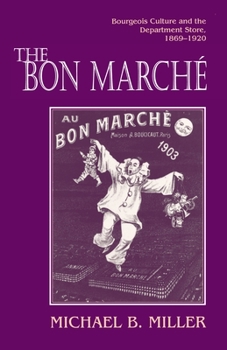The Bon Marché: Bourgeois Culture and the Department Store, 1869-1920
Select Format
Select Condition 
Book Overview
In this comprehensive social history of the Bon March , the Parisian department store that was the largest in the world before 1914, Michael Miller explores the bourgeois identities, ambitions, and anxieties that the new emporia so vividly dramatized. Through an original interpretation of paternalism, public images, and family-firm relationships, he shows how this new business enterprise succeeded in reconciling traditional values with the coming...
Format:Paperback
Language:English
ISBN:069103494X
ISBN13:9780691034942
Release Date:May 1994
Publisher:Princeton University Press
Length:304 Pages
Weight:0.80 lbs.
Dimensions:0.8" x 5.5" x 8.5"
Customer Reviews
2 ratings
Late 19th Century Paris
Published by Thriftbooks.com User , 15 years ago
I read this book for a class, and I was pleasantly surprised by how readable it was. I was expecting a dense book filled with scholarly arguments, and while Miller has some strong beliefs about the topic, he tells a good story here. I enjoyed the book. Miller's book looks at the Bon Marche, a major department store in Paris that thrived from about 1870 until the World War I era. The Bon Marche played a significant role in changing the consumer culture in France, pulling people away from small shops and family firms and encouraging them to enjoy the shopping experience. There were positives and negatives to the changes, but there was no turning back once those changes were made. Miller outlines the inner workings of the Bon Marche, explaining how the employee hierarchy was structured. He also details the store's marketing efforts and the effect they had on persuading the French middle class to flock to the Bon Marche. Even though this store was hitting its stride 90-140 years ago, in many cases the book reads like it could have been written about Macy's, Nordstrom or JC Penney. If you have to read this book for a class, don't fret. It's actually pretty interesting, and this is from someone who has minimal interest in economics or business.
A riveting journey through a French department store
Published by Thriftbooks.com User , 17 years ago
Michael Miller's The Bon Marché: Bourgeois Culture and the Department Store, 1869-1920 is fundamentally a book about changes in the nineteenth-century Parisian retail market and their effects on the identity and aspirations of the Parisian bourgeoisie. Miller seeks to model a professional change in the way historians craft narratives of social and entrepreneurial history through his treatment of the Boucicaut family and the changes involved in their highly successful Bon Marché store. For Miller, change in general, but particularly business and social change, is complex, not easily explained through class and cultural dichotomies. The success of the Bon Marché and the emerging influence of the French bourgeoisie in the late nineteenth century did not occur "through a radical break with the past" (11). Instead these changes involve complex mélanges of tradition with innovation. Following a fast-paced introduction that sets Miller's idea of complex change against the previous works of business and social historians, Part I of the book situates the Bon Marché within the nineteenth-century context of emerging business practices and shifting bourgeois attitudes. The creation of the world's largest department store involved a gradual evolution of the French business culture. Miller explains the momentous 1869 groundbreaking ceremony of the new Bon Marché and the store's subsequent successes through a complicated intersection of a transformation in mass society, personalization in bureaucratization, and innovations in rationalization. "Part Two: Internal Relations" aptly comprises the book's center, for it is indeed the heart of the work. Forcibly written and amply documented, this section locates the Bon Marché within the Parisian family, social and business environments, and details managerial practices that catapulted the house of Boucicaut above its competitors in the latter part of the nineteenth century and the early twentieth century. In contrast to André Saint-Martin's understanding that "all department story history...is dominated by this idea...circulate the capital as often as possible" (58), Miller argues persuasively that "for the Boucicauts, building the Bon Marché required more than pioneering marketing strategies and administrative structures" (77). Miller does not present a hagiography of Aristide and Marguerite Boucicaut as purely pro-employee or pro-middle class. Yet, neither does he present them as anti-worker. His narrative depicts the Boucicauts as family shopkeepers (albeit keepers of the world's largest shop) of a traditional social system who possessed the wherewithal to facilitate and adapt to changes in French bourgeois culture, expectations, and behavior. Miller explains their tradition-plus-dynamism managerial formula this way: "Basically wedded to the French household tradition, the Boucicauts were to cope with fundamental changes in their culture, not by abandoning its practices and its tenets, but by r






